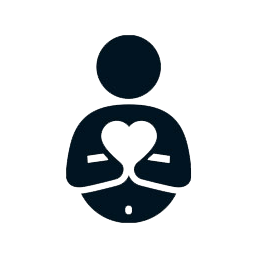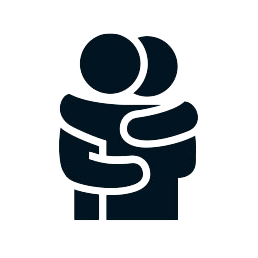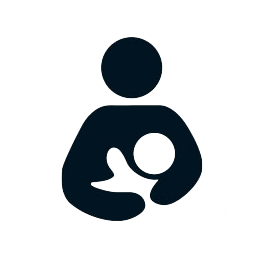Prenatal Assessment including BP and weight checks.
At every visit, we provide regular blood pressure and weight checks to all our pregnant moms; however, for our moms with high blood pressure issues or high-risk pregnancy, blood pressure checks are conducted more frequently at home, according to the doctor’s orders. We also provide education regarding self-care during pregnancy, the importance of prenatal care, healthy food choice, and routine checkups are discussed. Education about the changes and the discomforts that may occur during different stages of pregnancy and what to do about them. Families are also provided with education, risk, and warning signs of pregnancy-related health conditions such as gestational diabetes, preeclampsia, and hypertension, etc. Diseases such as STD, genetic disorders, environmental, and mental health conditions are also evaluated and discussed in detail. The effects of smoking, alcohol, and drug use during pregnancy are also discussed.
Families are well informed through our education plan and are able to appropriately make decisions that will result in a healthy pregnancy and childbirth.
Medical encounter and Medication reconciliations.
During the doctor’s visit, our nurses are present to help provide clarity about some medical tests, medications, medical processes, and procedures that may be difficult for moms to understand and to advocate for them when and if needed.
Accompany, prepare, and provide Support during delivery.
Our nurse consultants are able to prepare and accompany some of our moms to the hospital during delivery on request. This is beneficial to those moms whose family members may not be within reach due to the nature of their jobs or may be out of town. It may also be beneficial for those whose family members live in a different city, town, or state.
Meals, medications, and grocery pickups
Part of our numerous services is to help families with meals, medication, and grocery pick up during and after delivery. This will enable mom to focus on caring for her newborn baby without the burden of driving to the pharmacy or grocery store. It also helps to prevent exposing the newborn baby to adverse health conditions.
Prenatal Care, Screening, and Tests
During pregnancy, it is important that pregnant women have access to health care early so that they can be seen by a health care provider in order to prevent adverse health conditions that may arise due to pregnancy.
Frequent prenatal checkups are recommended even when the woman feels well for the health of both mother and baby.
At the visit, parents can voice their concerns and ask as many questions as they want.
Parents are encouraged to write down their questions prior to their appointment dates.
During your first visit, the health care provider will want to know about your present and past medical history, including the medical history of the father of the baby and also your family health history.
The doctor will determine the due date, which is 4o weeks, by asking for the first day of your last menstrual period. When the pregnancy is past 37 weeks, it is considered full-term and below 37 weeks is preterm.
Women are given some exams, such as weight, height, and blood pressure checks. Some routine test is also conducted during the doctor’s visits, such as pelvic exams. Some tests will be recommended at different stages of the pregnancy, such as a Blood test which is given during your first visit to determine blood type, RH factor, immunity to rubella, and iron level. A blood test is also used for any sign of sexually transmitted diseases such as HIV, Hepatitis B, etc. Other tests that are given during your first visit include a pap test, which is used to test for cervical cancer.
Urine tests are conducted at every visit to check for urinary tract infections, protein, and sugar levels in the body.
Blood Sugar test can be given between 7 and 8 weeks to check for gestational diabetes.
Ultrasound may be performed after the 5th week of pregnancy to determine the age of the baby, check for heart rate, determine if there is a problem with the baby, and also to determine the position of the baby. Anomaly ultrasound, also known as the anatomy scan, may be performed between 18 and 20 weeks to determine the size of the baby, birth defects, or other problems.
Other tests that can be carried out during pregnancy include:
- Chorionic villus sampling (CVS)
- Amniocentesis and Triple or quad screen tests
Chorionic Villus Sampling
This is a test that may be performed at the 10 and the 12 weeks. During this test, some tissue samples of the placenta are collected and used to check for genetic disorders.
Triple or Quad Screen test
This is a maternal serum test that is conducted during the second trimester, between the 15 and the 20 weeks. It is used to determine certain birth defects, such as chromosomal disorders or neural tube defects.
Amniocentesis
This test is conducted between 15 and 18 weeks if necessary. The fluid around the baby is collected to measure the baby’s protein level in other to determine certain birth defects such as chromosomal and genetic disorders such as Down syndromes, cystic fibrosis, or Tay-Sachs disease.
During the prenatal visit, the health care provider will determine if immunizations are up to date. Good dental care is also recommended during pregnancy because pregnancy increases the risk of cavity and gum disease, which may lead to other health issues for both mother and baby.
Staying healthy during pregnancy also includes healthy diets, and avoiding certain household and workplace chemicals such as paints, lead, cleaning fluids that can be inhaled. Lead poisoning can be transferred from mother to baby. Lead can be found in water, dust, soil, lead paint, etc. Pregnant women who have been exposed to lead can be tested by their doctors to determine their blood lead level.
It is important that pregnant women avoid contact with cat feces, mice, and rats because their feces can cause some birth defects. Cat owners should ensure that all of their family members or friends take care of the litter box. Hand gloves are required for gardening in soil suspected of cat feces.
Alcohol, tobacco smoking, and drug use during pregnancy should be prohibited.
Alcohol consumption during pregnancy can lead to fetal alcohol syndrome (FAS), which may result in the baby having some mental and physical problems. Tobacco smoking and secondhand smoke inhalation during pregnancy also have some neurological effects on the baby. Any form of drug use during pregnancy can be detrimental to the baby and may result in neonatal abstinence syndrome (NAS) after birth. Hot tubs and Saunas should also be avoided during pregnancy as the heat may cause some spinal cord defects and brain damage.
Intimate partner violence may also result in harm to both mother and child. Pregnant women should seek help if they are involved in a violent relationship.



